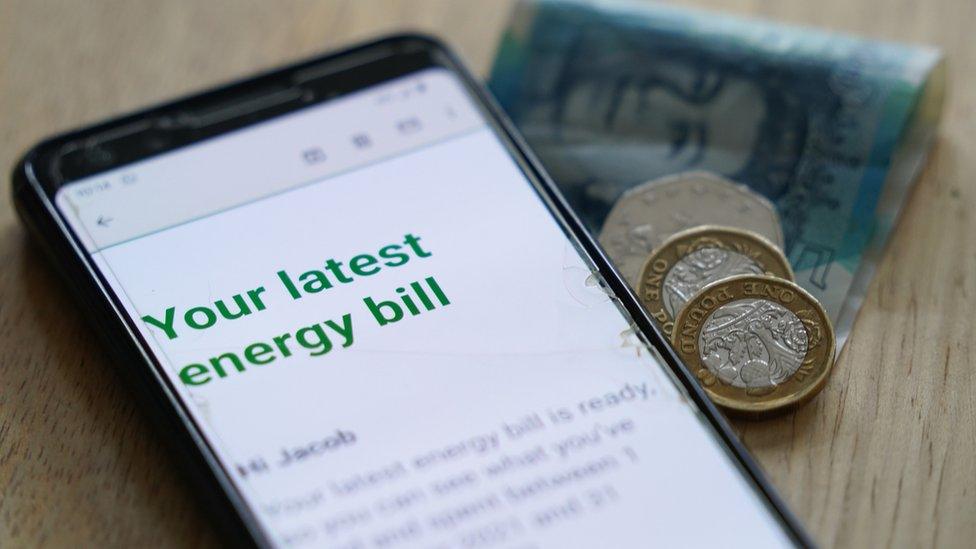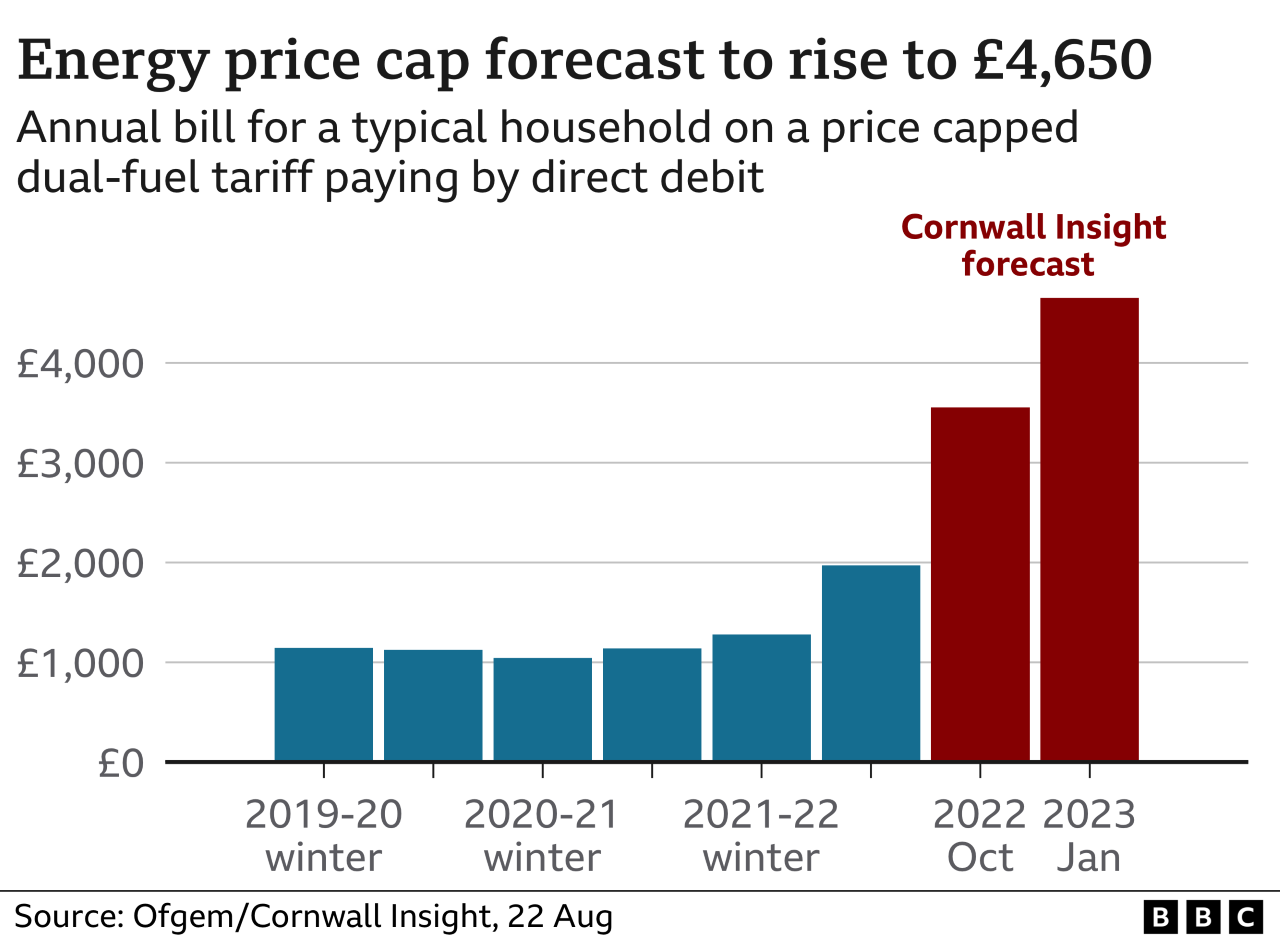Scottish Power's £100bn plan to freeze energy bills for two years
- Published
- comments

Ofgem's energy price cap is expected to rise to more than £3,500
One of the UK's largest power companies is proposing a £100bn plan to freeze energy bills for two years.
Scottish Power's chief executive Keith Anderson has presented the plans to UK Business Secretary Kwasi Kwarteng.
Mr Anderson told BBC Scotland that the UK government was "seriously considering" the proposal.
He will present the same plan to Scottish First Minister Nicola Sturgeon at a special summit she is chairing on the energy bills crisis.
The price cap sets the maximum price that suppliers can charge households for each unit of energy they use.
It rose by 54% in April, meaning a household using a typical amount of gas and electricity would pay £1,971 per year.
Regulators at Ofgem are due to announce the revised limit on Friday, when this figure is expected to rise to £3,576. This is likely to be followed by further increases in 2023.
Energy suppliers Scottish Power, OVO Energy and E.On are also due to take part in Tuesday's summit, with Ms Sturgeon having already insisted that the rise in the cap in October "can't be allowed to go ahead".


Scottish Power's plan to stave off an energy price emergency would involve the government guaranteeing loans to the energy companies.
This would enable them to keep bills frozen while buying the gas needed for the next two years.
The £100bn figure is Scottish Power's best estimate of the difference between what it will actually cost to buy the energy and the current price cap.
The so-called deficit fund would be repaid through bills over the next 20 or so years.
Sources close to the company said that Kwasi Kwarteng, who is tipped to be the next chancellor if Liz Truss is the next prime minister, was broadly receptive to the idea.
However, sources close to Mr Kwarteng would not be drawn on his enthusiasm, saying: "We had a meeting about it - that's all."

Mr Anderson told BBC Radio's BBC Good Morning Scotland programme that "bold" action was needed to bring down bills as he warned the Ofgem price hike would be "horrific".
He said: "I think we've got to a stage now where this is a national crisis, it's of the scale of the pandemic and we need national action."
The Scottish Power boss proposed the price cap should be frozen at the current level for at least two years as the price of wholesale gas continues to rise.
He urged Westminster to set up a deficit fund to cover the difference between what people pay for energy and how much it costs to supply their homes.
Keith Anderson of Scottish Power said his company's plan was being seriously considered by UK ministers
Under Scottish Power's plan, the cost could be repaid over the next 15 to 20 years and would be underwritten by the UK government.
Mr Anderson said he had discussed his proposals with Mr Kwarteng and the chancellor Nadhim Zahawi.
Asked if the business secretary had indicated support for the plans, the Scottish Power chief executive said: "So, yep. We've been through all of the details of this fund with him.
"We've been through all of the details with the current chancellor and other members of the Cabinet as well and I think this is being seriously considered."
He added: "I think it's being looked at as probably one of the best ways of dealing with the issue in the short term, in the short to medium term. But the government will also look at other options."
Asked what Tuesday's meeting with the Scottish government would bring, Mr Anderson replied: "The first and most important thing is to protect customers, to stop this price hitting customers' bills.
"And if we can all agree on that, that sends a very powerful message to the UK government."
A UK government spokesperson said: "We know the pressures people are facing with rising costs, which is why we have continually taken action to help households by phasing in £37 billion worth of support.
"In the immediate term, we are giving a £400 discount on energy bills over winter and eight million of the most vulnerable households will see £1,200 extra support, provided in instalments across the year.
"We have provided an extra £82 million for the Scottish Government to help vulnerable families at their discretion. This is in addition to the significant income tax and welfare powers they already have."
Ms Sturgeon has insisted that the renationalisation of energy companies "should be on the table" but said Scotland did not have the power to do that.
She has also called for the price cap increase to be cancelled, and for the financial support already offered by the UK government to be doubled.
Ms Sturgeon said: "The next rise in energy bills simply shouldn't be allowed to go ahead.
"It is the UK government that can take VAT off fuel bills, it is the UK that has access to borrowing powers that would allow them to increase the cash support to families across the country.
"So we need to see the UK government take its responsibilities seriously and act to increase the overall budget that is available for us to deal with these pressing problems".

The Poverty Alliance is among the organisations represented in the crisis talks.
It is calling on business leaders and Holyrood ministers to guarantee no-one in Scotland will be disconnected from their power supply this winter and to ensure that everyone who needs it can access energy firms' hardship funds.
The organisation also wants to see a reduction in the number of people on pre-payment meters.
Director Peter Kelly told Good Morning Scotland: "The parties round this table this afternoon, particularly the energy companies and the Scottish government, do have a responsibility and do have power to take action.
"That doesn't reduce the fact that UK government have significant responsibility and we're calling on them to do much more than they're doing at the moment."


It's billed as a summit, but it lacks key players to reach the heights required to tackle the energy price crisis: the UK government, the big oil and gas producers, and also missing will be big business customers for energy.
What today's meeting can do is agree a common approach from energy suppliers and money advisers - the message being that it's best to be in touch with your supplier before debt mounts up, before you face the risk of disconnection. Managing debt is going to be difficult for all those involved.
The energy retailers are recruiting staff to deal with expected higher volumes of customer calls, with concern about the impact on staff of being at the front line, handling calls from people in distress.
There may be some discussion of where Scottish and local government resources can be redirected to where they could have most impact.
But the focus will also be on pressuring UK ministers to use their borrowing firepower and to re-shape the market, with Ofgem implementing much of that for the whole of Britain.
Whitehall is the part of this challenge that works with governments of other countries on common projects to shift prices and open up energy supply routes.
What we're hearing from the energy suppliers is that they think the answer will be a cap on prices preferably where they are, and a giant UK government programme, worth tens of billions of pounds, to shoulder the higher costs to customers, with borrowing. That could then be recouped, potentially over several decades.
The way they're presenting that to the incoming prime minister is that this is not a giveaway, it need not be higher tax, but it will be necessary.
